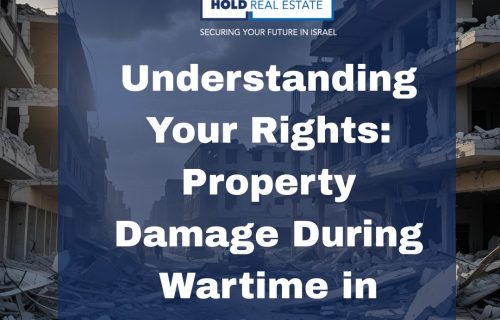Why Israeli Real Estate is still a good investment in 2024
Why Israeli Real Estate is still a good Investment in 2024: Key Trends and Opportunities
If you’ve considered investing in Israeli real estate, there’s never been a more relevant time to take the leap. The market is buzzing, and with a rapidly growing population, ongoing housing shortages, and ambitious infrastructure projects like the future Tel Aviv Metro, the potential for growth and solid returns is ripe.
Supply vs. Demand: The Driving Force Behind Rising Prices
A key factor fueling the surge in Israeli real estate prices is simple: there just aren’t enough homes to accommodate the growing population. By mid-2024, the country was already facing a shortage of almost 200,000 housing units. With the population expected to soar to 13.2 million by 2040, this demand is only set to grow.
For years, Israel has grappled with trying to keep up with its housing needs. Although the government has made efforts to accelerate construction and ease zoning regulations, it’s been a slow process. The number of new homes being built each year still falls short of what’s required.
This ongoing imbalance between supply and demand has been pushing property prices steadily upward since the 2008 financial crisis. For investors, that’s great news. It means real estate values are likely to continue climbing, making now an excellent time to enter the market.
Urban Renewal: A Major Investment Opportunity
One of the most exciting aspects of the Israeli real estate market is urban renewal. The “Pinui Ubinui” (evacuate and rebuild) projects are at the heart of this transformation. These initiatives focus on older buildings, especially those constructed before the 1980s, which weren’t built to modern safety standards. Pinui Ubinui projects replace these outdated structures with new ones, often expanding the housing capacity by up to four times.
Redevelopment is not just about adding more homes—it’s about revitalizing entire neighborhoods, particularly in high-demand areas like Tel Aviv and the surrounding Gush Dan region.
Another promising area is the redevelopment of former military bases. Government initiatives have repurposed these sites for housing, turning them into vibrant urban hubs. The Sarona military base in Tel Aviv is a prime example, and similar projects are in the works, including at the former Sde Dov airport
Infrastructure: The Game Changer
One of the biggest factors set to shape the future of Israeli real estate is the country’s investment in infrastructure, particularly public transportation. The upcoming Tel Aviv Metro is a perfect example. Once completed, it will feature two lines and 109 stations, covering 150 kilometers and connecting key cities across the Gush Dan metropolitan area.
The Metro is expected to serve up to two million passengers daily and will dramatically reduce travel times. For instance, a commute from Petach Tikva to Tel Aviv that currently takes 72 minutes by bus or nearly an hour by car will be reduced to just 27 minutes on the Metro. This kind of convenience will increase demand for properties near the new stations. As an investor, proximity to these Metro lines could become a major selling point, significantly boosting property values in those areas.
Investing in New Developments: A Flexible Option
For those interested in new developments, there are plenty of attractive opportunities. that come with favorable financing options. Many new projects require only a 10-15% payment upfront, with the remaining balance payable upon completion. This extended timeframe gives investors more flexibility to secure financing while benefiting from the property’s appreciation over time.
The Rental Market: A Steady Income Stream
The Israeli rental market is another area seeing tremendous growth. Almost a third of Israeli households rent their homes, and rents are steadily rising as the housing shortage continues. Rental yields are currently around 2,5%-3,5% p.a, but they’re expected to increase as demand grows.
The potential for steady, long-term rental income is strong, especially as tenants in Israel tend to rent for longer periods, often until they’re in their mid-30s. For investors, this means stable cash flow and less turnover. Plus, with property values steadily appreciating, there’s also the potential for significant capital gains.
Is Now the Right Time to Invest?
In short, yes! Israel’s real estate market is poised for continued growth, thanks to a unique combination of factors: a booming population, a persistent housing shortage, and significant infrastructure improvements. Additionally, an increase in Aliyah (immigration to Israel) due to rising anti-Semitism worldwide is expected to fuel demand further.
Urban renewal projects are transforming older neighborhoods, and the Tel Aviv Metro will revolutionize commuting, making previously hard-to-reach areas more accessible. Whether you’re looking to buy, develop, or invest in rental properties, the opportunities are abundant.
As the country continues to grow and evolve, real estate will remain a key driver of economic prosperity. Investors who act now stand to benefit the most from these trends. So, if you’ve been considering getting into the Israeli property market, there’s no time like now.
To set up a consultation with Hold Real Estate.
Email info@hold.co.il or visit https://hold.co.il/futureinisrael
*The contents of this article are designed to provide the reader with general information and not to serve as legal or professional advice for a particular transaction. Readers are advised to obtain advice from qualified professionals before entering into any transaction.
- Jun 17, 2025
- Apr 24, 2025
- Mar 2, 2025



